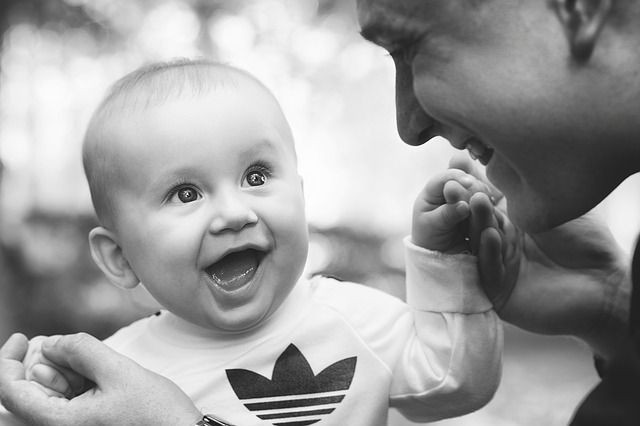The Imitation Game: New Babies Found Unable To Mimic Behaviors Weeks After Birth

Imitation is the best form of flattery for adults, but for newborns, it’s a milestone. New babies are astute people-watchers who learn how to do things by observing the actions and body language of others. This is how they’re capable of knowing what to do without being given directions. However, is this imitation an innate ability or learned skill?
A recent study published in the journal Current Biology suggests imitation isn't an innate behavior, but one that is learned.
"Infants aren't born with the ability to copy what other people do, but they acquire that skill during the first months of life," said Professor Virginia Slaughter, study author and head of the School of Psychology at the University of Queensland in Australia, in a statement.
Slaughter and her international team of researchers observed more than 100 babies who were shown 11 gestures for 60 seconds each at 1, 3, 6, and 9 weeks of age. This helped researchers determine when exactly the infants began to imitate and which factors contributed to this emerging skill. The babies were shown four facial gestures (tongue protrusion, mouth opening, happy face, and sad face); two non-social objects simulating facial gestures (a spoon protruding through a tube and a box opening); two hand gestures (index finger protrusion and grasping); and three vocal gestures (‘‘mmm,’’ ‘‘eee,’’ and ‘‘click’’ sounds). The researchers recorded the number of times the infants made each gesture, then compared how often the infants' responses matched the models’ gestures.
The findings revealed the infants were just as likely to produce a different gesture as they were to produce a matching one. Slaughter admitted this result was not what they'd anticipated. They initially set out to examine whether differences in imitation among young infants would predict later imitation and other aspects of social development.
This contradicts the belief that babies have a born capacity to imitate expressions and sounds. Previous studies that prove newborns can imitate are extremely limited. Typically, researchers presented infants with two different behaviors, including tongue protruding or mouth opening. Both of these behaviors are commonly seen in newborns outside of imitation experiments.
"If infants also increase their tongue protrusions when an adult models a happy face or finger pointing, then it's not a case of imitation, but probably excitement at seeing an adult do something interesting," said Slaughter.
Dr. Seikhoo Bishnoi, a psychiatrist in India, believes babies are not born with the ability to imitate. "Imitation is learned behavior because in absence of stimulus imitation is not seen," he told Medical Daily.
Existing data suggests newborns do not imitate others until their second year of life and their ability to imitate different expressions and sounds is gradual throughout the toddler years. When they do possess the ability to imitate the actions of others, this serves as social learning. Their ability to imitate can tell us what the child knows and what he or she has not yet learned.
Bishnoi suggests increasing imitation means the child is learning continuously. This helps a child develop good cognitive skills, and possibly have a higher IQ and EQ (emotional intelligence) as compared to others.
The researchers are now analyzing additional data from the study to extend their research into the second year of life. They want to discover when infants really do begin to imitate and what factors may contribute to this newfound skill.
So, for those of us who’ve tirelessly tried to have newborns imitate us, it’s not us, it’s them — they will get it someday, just not yet.
Source: Oostenbroek J, Suddendorf T, Nielsen M et al. Comprehensive Longitudinal Study Challenges the Existence of Neonatal Imitation in Humans. Current Biology. 2016.
Published by Medicaldaily.com



























